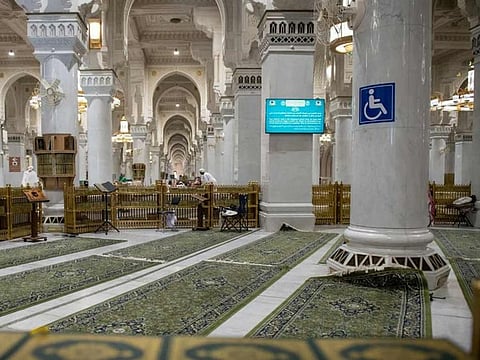Saudi Arabia: Six prayer areas allocated for physically challenged in Grand Mosque in Mecca
The facilities are designed to help them easily perform religious rites

Cairo: Six new prayer areas have been allocated for physically challenged worshippers at the Grand Mosque, Islam's holiest site in Mecca, Saudi Arabia, as part of facilities designed to help them easily perform religious rites.
The Saudi state agency responsible for the two holy mosques in Mecca and Medina stated that services for physically disabled worshippers include guidance signs, special pathways, accessible ramps, and free electric and manual transport carts.
The General Authority for Caring and Management of the Two Holy Mosques added that three of the six prayer places in the Grand Mosque are designated for males on the ground floor via Gate 68, and the first floor opposite Gate 91 and Al Shubykah Bridge 68. The three others, allocated for females, are accessible via Gate 88 on the ground floor, Gate 65 on the first floor and Prayer Area 15 overlooking the Mataf (circumambulation) courtyard that houses the Holy Kaaba.
The facilities are unveiled as more Muslims from around the world are heading to the Grand Mosque to perform Umrah or minor pilgrimage.
The new season of Umrah, which can be undertaken around the year, got underway in late June after the end of the annual Hajj pilgrimage that around 1.8 million Muslims from across the globe attended.
Saudi Arabia, Islam’s birthplace, has in recent months introduced a host of facilities for Muslims wishing to come to the country for Umrah. Authorities have extended the Umrah visa from 30 days to 90 and allowed holders to enter the kingdom via all land, air and sea outlets and leave from any airport. Women pilgrims are no longer required to be escorted by male guardians.
Muslims holding different types of entry visas such as personal, visit and tourism visas are allowed to undertake Umrah and visit Al Rawda Al Sharifa, where the tomb of the Prophet Mohammad (Peace Be Upon Him) is located at the Prophet’s Mosque in Medina after booking an e-appointment. Saudi citizens can also apply to invite their friends abroad to visit the kingdom and undertake Umrah.
Sign up for the Daily Briefing
Get the latest news and updates straight to your inbox


